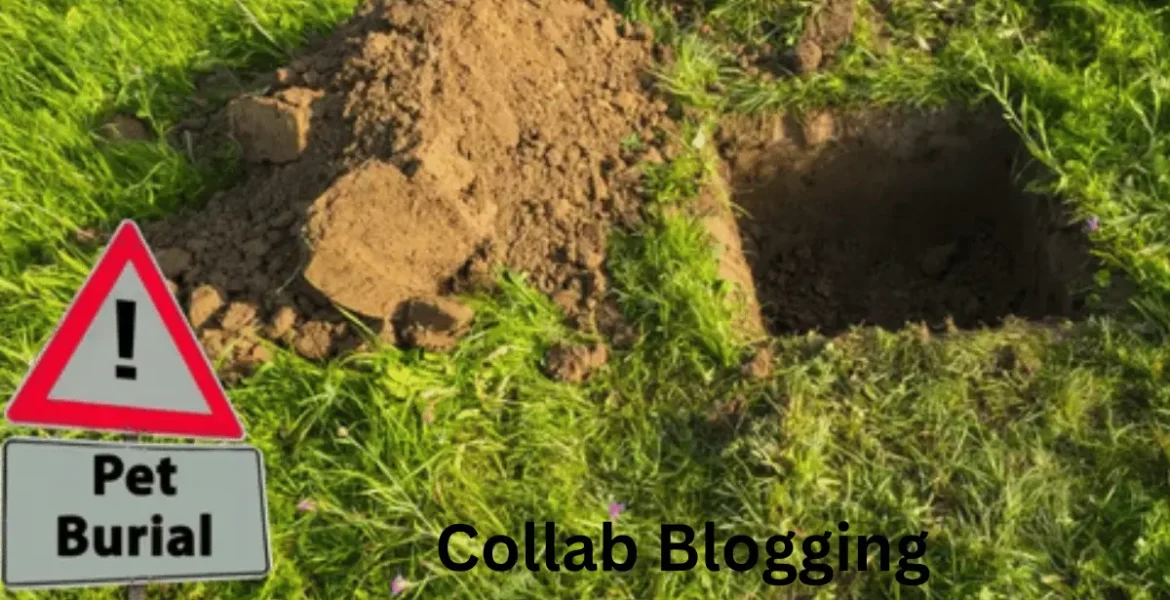Burying a pet in your backyard may seem like a simple way to say goodbye, but in many places, it is actually illegal. There are laws that prevent this practice due to concerns about health and safety. While it might feel like a personal and peaceful option, improper burial can lead to serious issues, such as contamination of the soil and water supply. Many people are unaware of these risks and the legal consequences.
These laws are in place to protect both the environment and public health. In this article, we will explore why burying your pet in your yard is not allowed in some areas. We will also look at safe, legal alternatives that can help you handle your pet’s remains in a respectful and environmentally friendly way.
Table of Contents
Pet Burial Laws
Pet burial laws vary widely depending on where you live, with some areas strictly prohibiting burying pets in backyards. These regulations are usually enforced at the local or state level, meaning they can differ significantly from one place to another. In some regions, there may be specific guidelines about burial depth, distance from water sources, or the materials used for the burial.
Reasons for Pet Burial Restrictions
The main reason for these laws is to prevent contamination of the environment. Pets’ remains can carry diseases, parasites, or bacteria that could seep into the soil or groundwater. Improperly buried remains might also attract scavengers, potentially spreading illness. Additionally, the remains could impact local wildlife, who might be exposed to harmful pathogens or chemicals present in the body.
Checking Local Laws
It’s crucial to check the laws in your area before deciding how to handle your pet’s remains. Many communities have specific guidelines for pet burials or recommend safer alternatives, such as cremation. Violating these regulations could result in fines, legal issues, or environmental harm, so it’s essential to be informed about the laws in your location to avoid any penalties.
Health and Environmental Concerns
Risks to Groundwater and Soil
When a pet is buried, harmful substances like bacteria and parasites can seep into the soil and contaminate groundwater. This can pollute drinking water supplies, especially in areas with a high water table. Decomposing remains can also release toxic chemicals, like ammonia and methane, further degrading the environment.
Disease Transmission
Dead pets can carry diseases, such as rabies or roundworms, that may linger in the soil. If buried improperly, these pathogens can spread to other animals or humans, posing a health risk. Wild animals may dig up remains and become exposed to harmful diseases.
Attraction of Scavengers
Improperly buried pets can attract scavengers like raccoons or coyotes, who may dig up the remains. This can spread disease and lead to unpleasant situations for neighbors who encounter the remains.
Environmental Impact
Decomposing pets can alter soil nutrients, disrupting local ecosystems. This imbalance can harm plants and wildlife over time. Proper disposal methods help minimize such environmental damage.
Legal Alternatives to Backyard Burial
Pet Cemeteries
One of the most common legal alternatives to backyard burial is using a pet cemetery. These cemeteries are specifically designed to handle pet burials and follow strict guidelines to ensure environmental safety. Many offer services like grave markers and ceremonial options to help owners honor their pets properly.
Cremation Services
Cremation is another popular choice for pet owners. It allows you to keep your pet’s ashes in a special urn or scatter them in a meaningful place. Many veterinary clinics offer cremation services, and some even provide options for private cremation if you want your pet’s remains returned to you.
Composting
Pet composting is an eco-friendly alternative that turns pet remains into nutrient-rich soil. Some companies offer services to compost pet remains professionally, ensuring it’s done safely and responsibly. This process can be a good option for environmentally conscious pet owners.
Rendering Services
Rendering involves turning pet remains into usable byproducts like animal feed or fertilizer. This process is typically handled by specialized companies. It’s a legal, environmentally safe way to dispose of your pet, and it avoids burial in your backyard.
Penalties for Violating Burial Laws
Fines
In many areas, violating pet burial laws can result in fines. These fines can vary depending on the location and the severity of the violation. The amount can range from a small fee to a more substantial penalty, especially if the burial has caused environmental harm or health concerns.
Legal Action
In some cases, violating burial laws can lead to more serious consequences, such as legal action. This could include being taken to court if the improper burial has resulted in significant damage to public health or the environment. Legal action may also involve the recovery of costs for cleanup or damage control.
Environmental Penalties
If a burial contaminates the soil or water supply, environmental agencies may impose additional penalties. These penalties are meant to cover the cost of mitigating environmental damage. Depending on the situation, they can be expensive and require long-term efforts to restore the affected area.
Criminal Charges
In rare cases, improper pet burial could lead to criminal charges, especially if it’s proven that the burial was done intentionally to avoid legal requirements. Criminal charges can carry serious consequences, including a criminal record or jail time, in extreme cases.
Conclusion
Burying your pet in your backyard may seem like a simple and personal way to say goodbye, but it can lead to serious legal and environmental problems. Many areas have strict laws to prevent backyard burials due to the risk of contaminating soil and water. Improper burial can also expose humans and animals to harmful diseases. It’s important to be aware of the laws in your area to avoid fines or legal consequences.
Thankfully, there are several legal alternatives to backyard burial. Pet cemeteries, cremation, composting, and rendering services offer safe and respectful ways to handle your pet’s remains. These options help protect the environment and public health while giving you a way to honor your pet’s memory. Always choose a method that follows the law and ensures proper disposal to avoid any future issues.








Visit us
March 3, 2025 at 12:36 pmGreat work on this thought-provoking post. Your writing is captivating and your thoughts are well-articulated. Looking forward to more posts.
https://london-times-8m6ot.kinsta.page/the-mystery-of-01174622042-silent-calls-and-boiler-scams-leave-brits-fuming/
💌 You have received 1 notification № 531591. Go > https://graph.org/GET-BITCOIN-TRANSFER-02-23-2?hs=127d9ac2ba7d5071e6506755538c6e86& 💌
March 8, 2025 at 11:27 amkgsotf
Floy
March 8, 2025 at 2:33 pmYour style is funny and informative, I have learnt a lot from it.
https://globaldefence.team
Staci
March 8, 2025 at 7:30 pmAmazing! This blog looks exactly like my old one!
It’s on a completely different topic but it has pretty much the
same page layout and design. Wonderful choice of colors!
Also visit my blog post … See details
📞 + 0.75506884 BTC.GET - https://graph.org/GET-BITCOIN-TRANSFER-02-23-2?hs=127d9ac2ba7d5071e6506755538c6e86& 📞
March 15, 2025 at 12:04 pmss16cu
Shawanda
March 15, 2025 at 11:22 pmI’m astounded by your ability to transform mundane topics into captivating writing. Bravo!
https://drjack.world
Klara
March 16, 2025 at 12:47 pmYour writing has a lively quality that creates vivid pictures in my mind. I can immediately visualize every aspect you portray.
https://quero.party
🔖 Ticket- Process 1,649058 bitcoin. Get => https://graph.org/Message--685-03-25?hs=127d9ac2ba7d5071e6506755538c6e86& 🔖
March 29, 2025 at 5:37 amso8d4g
🔐 + 1.264721 BTC.NEXT - https://graph.org/Message--0484-03-25?hs=127d9ac2ba7d5071e6506755538c6e86& 🔐
March 29, 2025 at 6:41 pmyql7ov
🗒 + 1.789226 BTC.NEXT - https://graph.org/Message--05654-03-25?hs=127d9ac2ba7d5071e6506755538c6e86& 🗒
April 10, 2025 at 4:54 pmsxlwjh
Code of destiny
April 16, 2025 at 4:40 pmI’m really impressed together with your writing skills and also with the format for your blog. Is this a paid topic or did you modify it your self? Either way stay up the excellent quality writing, it’s rare to look a nice blog like this one today!
https://codeofdestiny.art/
Ivan
April 16, 2025 at 6:10 pmI am really inspired together with your writing abilities and also
with the layout to your blog. Is this a paid theme or did you customize it yourself?
Either way stay up the excellent high quality writing, it’s uncommon to look a great weblog
like this one nowadays. TikTok Algorithm!
Feel free to visit my site Snipfeed
Thomas Smith
July 23, 2025 at 8:57 pmSuch a valuable insight.
https://secure2.websrvcs.com/system/media/play.asp?id=30216&key=7861DC2E-0285-4484-9898-969FA6940EFF
Charles Andrew Davies
July 24, 2025 at 12:13 pmMore content pieces like this would make the web more useful.
https://eridan.websrvcs.com/system/media/Play.asp?id=30216&key=FE2371A7-7A67-4A44-ADCE-EC9663409BEA
George James Wilson
July 24, 2025 at 9:08 pmI took away a great deal from this.
http://spear1340.com/linux/linux-boot-messages?destination=node/123Fpage3D121
Mark John Harris
July 25, 2025 at 1:02 pmThis is the kind of writing I enjoy reading.
http://www.sickautos.com/?q=comment/232069
Henry David Martin
July 25, 2025 at 9:22 pmThanks for publishing. It’s a solid effort.
https://seoprobox.click/increase-backlinks-ahrefs-domain-rating-50-60-70-moz-domain-authority-20-30-and-guest-posting-32141/
Paul Thompson
July 27, 2025 at 2:41 pmI particularly appreciated the approach this was explained.
http://www.sickautos.com/?q=comment/219928
Arthur Robert Green
July 28, 2025 at 9:22 pmThanks for publishing. It’s well done.
https://theboombusiness.com/considerations-before-selling-your-home/
Stephen John Jones
July 29, 2025 at 2:12 pmSuch a informative resource.
https://dn2i.com/finance/personal_finance/alfa/page4.htm
Matthew Joseph Jackson
July 30, 2025 at 3:11 pmI took away a great deal from this.
http://spear1340.com/linux/linux-boot-messages?destination=node/123Fpage3D53
Andrew Davies
July 31, 2025 at 1:11 amThanks for creating this. It’s excellent.
https://mmh-invest.com/index.php/component/k2/item/5?start=24710
Joseph Jones
July 31, 2025 at 9:53 pmThis is the kind of information I find helpful.
http://xiglute.com/forums/topic/238/compartilhamento-no-facebook/view/post_id/244493
Paul Harris
August 1, 2025 at 1:14 pmYou’ve undoubtedly put in effort.
https://www.factsnews.co/brand-new-reduced-price-santander-equity-launch-for-uk-house-owners.html
Daniel William Johnson
August 2, 2025 at 12:51 pmI discovered useful points from this.
https://www.cgaa.org/article/santander-equity-release
Peter Taylor
August 3, 2025 at 12:35 pmThe detail in this article is noteworthy.
https://telegra.ph/Transform-Your-Home-A-Guide-to-Securing-Loft-Conversion-Loans-for-Homeowners-with-Adverse-Credit-06-05